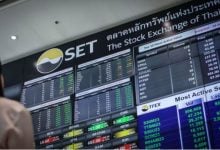Thai PM and central bank clash over interest rates amid low inflation

The clash between Prime Minister Srettha Thavisin, who also holds the Finance Minister portfolio, and the Bank of Thailand (BoT) intensified. The prime minister has been vocal about his belief that the central bank should lower its interest rates as inflation rates have decreased.
On a social media platform, PM Srettha blamed the BoT for causing harm to the economy by maintaining high-interest rates despite subsiding inflation. This post followed his parliamentary speech on January 3, where the Thai prime minister suggested that the risks to the country’s economy should be taken into account when deciding on monetary policies.
“Monetary policy should align with economic trends, tighter financial conditions, and the boost from government policies.”
He reiterated his stance on Monday.
“As inflation is very low, an interest rate reduction should be considered.”
The prime minister’s chief advisor, Kittiratt Na-Ranong, supports the Bangkok-born PM’s views, stating that a significant and swift reduction in interest rates is the way out of economic problems. He also added that the central bank should back the government’s policies.
These statements not only indicate a disagreement in policy between the government and the central bank but also imply an intervention in the role of the BoT, which is supposed to be independent.
Further rate increases
Despite the central bank signalling no need for further rate increases, BoT Governor Sethaput Suthiwartnarueput comments that the recent consumer price decline was a result of state subsidies, indicating that the bank might be reluctant to ease rates soon.
However, the Monetary Policy Committee (MPC) of the BoT hinted at a prolonged pause in rate hikes to forestall potential economic and financial system shocks due to an uncertain outlook. The committee started raising rates in August 2022, with eight increments of 0.25 percentage points, taking the borrowing cost to a decade-high of 2.5% in September last year. The rate hikes were halted in November last year, with the next MPC meeting on the policy rate scheduled for February 7.
Thailand’s policy rate is the lowest in Southeast Asia, averaging between 3.25% and 3.5% for the region. The country’s inflation rate is also lower than its regional counterparts.
Consumer prices in Thailand have been in a deflationary state for three months through December, with a contraction of 0.83% in December 2023. This has led some economists to forecast a potential rate cut later this year.
However, Burin Adulwattana, Kasikorn Research Centre Managing Director, stated that deflation alone can’t be the deciding factor for a rate cut.
“The Bank of Thailand will need to consider other economic factors as well, especially the government stimulus measures.”
Asian currencies
ASPS noted in a research document that inconsistent monetary and financial policies make them less effective.
“Thailand’s interest rate is 2.5%, the highest in 10 years, while Thailand’s inflation shrank three consecutive months from October to December last year.”
According to forecasts, reducing the interest rate could weaken the baht by 0.87% to below 35 to the US dollar, making the Thai currency the weakest among Asian currencies this year.
Economists predict that the BoT of Thailand will begin cutting its policy rate in the second half of this year based on economic forecasts and the likelihood of the Federal Reserve cutting rates in the second quarter.
Amonthep Chawla, chief economist of CIMB Thai Bank, stated that he expects the central bank to cut its policy rate twice in the third and fourth quarters of this year, starting in August. On the other hand, Naris Sathapholdeja, chief economist of ttb analytics, believes the central bank would start cutting its rate in the second half due to low inflation and economic growth.
Latest Thailand News
Follow The Thaiger on Google News:


























